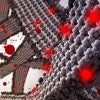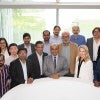
Rice scientists develop hydrogel platform for long-lasting, precision drug delivery
Rice scientists have developed a new drug delivery platform that could make it easier for patients to take their medications and may even boost drug efficacy.

Rice scientists develop hydrogel platform for long-lasting, precision drug delivery
Rice scientists have developed a new drug delivery platform that could make it easier for patients to take their medications and may even boost drug efficacy.

Rice algorithms take on quantum adversary
Rice computer scientists have developed algorithms that account for quantum noise that is not just random, but malicious interference from an adversary.

RBL LLC secures investment from Carnrite Ventures
RBL LLC has secured a strategic investment from Carnrite Ventures that will support the development of its growing pipeline of therapeutic companies.

Wireless implant network could transform cardiac, neurological care
Researchers at Rice and collaborators have developed a wireless network of miniature bioelectric implants that could transform treatment for heart failure, spinal cord injury and other chronic conditions. The system would integrate with patient anatomy easier than conventional medical implants, eliminating the need for batteries and invasive wiring.

Study examines use of AI for responsible research practices
A new study by Rice researchers explores large language models as a tool for streamlining responsible citation practices.

Wrinkles in atomically thin materials unlock ultraefficient electronics
Rice scientists have discovered that tiny creases in two-dimensional materials can control electrons’ spin with record precision, opening the path to ultracompact, energy-efficient devices.
Rice scientists pioneer transfer-free method to grow ultrathin semiconductors on electronics
A team of materials scientists at Rice has developed a new way to grow ultrathin semiconductors directly onto electronic components.

Ripples of the future: Rice researchers unlock powerful form of quantum interference
Rice researchers have demonstrated a form of quantum interference two orders of magnitude greater than any previously reported.

Twin founders: How 2 sisters are building health innovations at Rice
Rice's OwlSpark accelerator's newest cohort included twin founders with projects aiming to solve overlooked problems in patient care.

James F. Young, professor emeritus of electrical and computer engineering, dies at 81
James F. Young, professor emeritus of electrical and computer engineering at Rice, died May 18 in Hawaii. He was 81.

The RISING Center at Rice, a partnership accelerating U.S.-India collaboration in advanced materials and defense-related technologies, held a one-year review meeting on campus last month.

Rice, Baylor College of Medicine award seed grants for cancer research
Rice's Synthesis X Center and Baylor College of Medicine’s Dan L Duncan Comprehensive Cancer Center have awarded the second offering of a two-year seed grant program.

Nash and Swingle join leadership team at Rice Biotech Launch Pad
The Rice Biotech Launch Pad has appointed Amanda Nash and Kelsey L. Swingle to its leadership team.

Artificial intelligence is infamous for its resource-heavy training, but a new study may have found a solution in a novel communications system that markedly improves the way large language models train.

Rice experts are available to comment on digital health topics, including AI, wearable and ingestible devices, imaging and robotics.